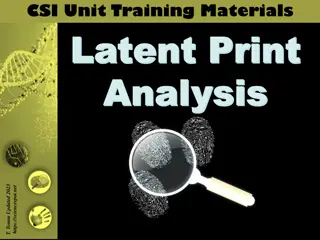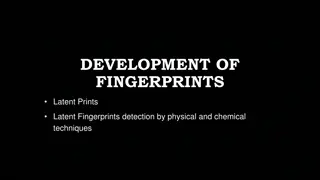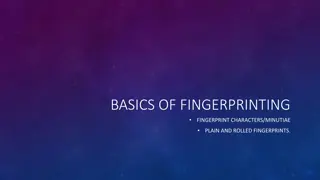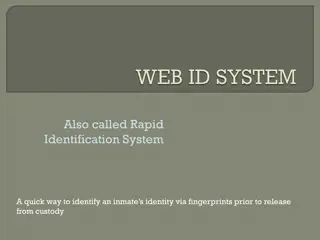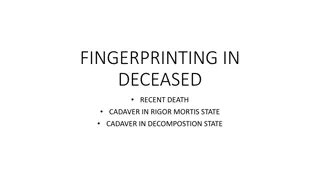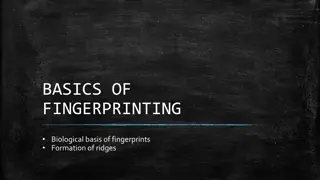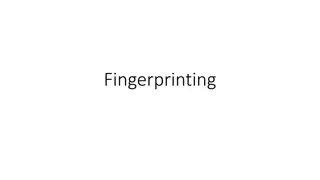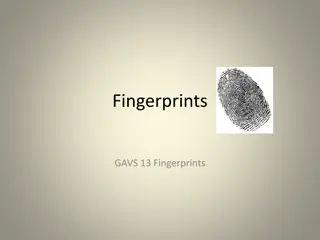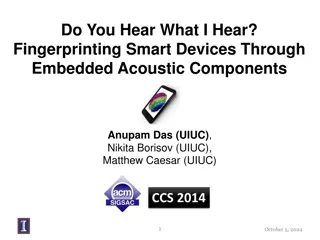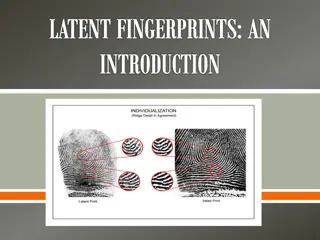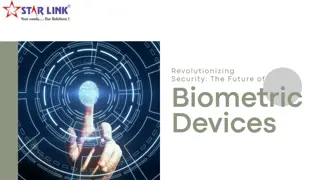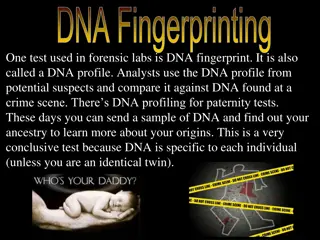Latent Print Analysis
Explore the comprehensive training materials for latent print analysis, covering topics such as fingerprint formation, identification methods, AFIS technology, collection techniques, and practical lab exercises. Gain insights into the importance of fingerprints, their unique features, and historical
0 views • 15 slides
Understanding Fingerprint Development Techniques
Exploring the development of latent fingerprints through physical and chemical methods, conditions affecting latent prints, and various fingerprint development techniques like visual examination, powder techniques, and chemical techniques. Techniques such as alternate light sources and powder method
2 views • 22 slides
Pulsed-Field Gel Electrophoresis: Separating Large DNA Molecules
Pulsed-Field Gel Electrophoresis (PFGE) is a technique developed to effectively separate large DNA molecules through the application of an electric field that periodically changes direction. This method, introduced by David C. Schwartz and Charles C. Cantor in 1984, revolutionized the resolution of
1 views • 11 slides
Basics of Fingerprinting and Fingerprint Characters
Understanding the basics of fingerprinting is crucial in forensic investigations. Fingerprint characters such as spur, hook, trifurcation, bifurcation, and more play a key role in identifying individuals through their fingerprints. The process involves taking known prints by manual or direct methods
0 views • 14 slides
Rapid Identification System for Inmate Release
The Rapid Identification System, also called Rapid ID System, provides a quick way to verify an inmate's identity using fingerprints before release from custody. It allows law enforcement agencies, including IPD users under SDSheriff, to log in and access the system. By searching the San Diego AFIS
3 views • 8 slides
Postmortem Fingerprinting Techniques in Deceased Individuals
Postmortem fingerprinting is essential in cases where identification is challenging due to factors like mass disasters or decomposition. This process involves preliminary preparations, methods of recording fingerprints, and specific techniques for cadavers in different states, such as recent death o
0 views • 21 slides
Understanding Latent Print Development Techniques
Latent prints, hidden impressions left behind by sweat pores on surfaces, can be developed using physical and chemical methods. Factors affecting latent prints include surface type, movement during contact, handling, and environmental conditions. Various surfaces require specific development techniq
0 views • 29 slides
Basics of Fingerprinting: Biological Formation of Ridges
Fingerprints are formed due to the proliferation of cells in the epidermis, resulting in ridges and patterns unique to each individual. The process begins in the embryonic stage with the development of volar pads on fingertips, palms, and soles. As the skin matures, primary and secondary ridges are
0 views • 11 slides
Solving the Murder of Mrs. Mary Smith: An Interactive Investigation Experience
Dive into a thrilling murder mystery as you help solve the case of Mrs. Mary Smith's tragic death. Explore evidence rooms, analyze fingerprints, hair samples, soil samples, and chemical details to unravel the mystery. Follow the clues, watch videos, and conduct interviews to uncover the truth behind
5 views • 17 slides
Forensic Science Lab: Fingerprint Collection and Classification
Engage in a hands-on forensic science lab to learn how to collect and classify inked fingerprints. In this lab, students will gather prints, use magnifying glasses, and categorize the prints according to specific patterns. Detailed steps and required equipment ensure a thorough understanding of the
0 views • 10 slides
Understanding Fingerprinting: Types, Classification, and Patterns
Fingerprinting is the oldest and reliable method of identifying individuals based on unique patterns on their fingertips. This article explores the definition of fingerprints, reasons for using them, classification methods, and the three main types of fingerprint patterns: Loop, Whorl, and Arch. Eac
0 views • 31 slides
Understanding Fingerprints and Their Role in Forensic Science
Fingerprints are unique identifiers left behind by individuals and play a crucial role in forensic investigations. This text delves into the science behind fingerprints, their composition, and how they are used in solving crimes. From the layers of the skin where fingerprints originate to the compar
0 views • 52 slides
Fingerprinting Smart Devices Through Acoustic Components
Smartphones can be uniquely identified through their embedded acoustic components, allowing for targeted advertising and secondary authentication. This method leverages sensors like microphones to create device fingerprints. The goal is to extract these fingerprints through scenarios involving audio
0 views • 25 slides
Understanding Latent Fingerprints and Development Processes
Delve into the world of latent fingerprints with an introduction to fingerprint patterns, development processes using black, magnetic, and silver powders, as well as techniques involving brushes, wands, and lifting methods. An exercise assignment explores print development on various surfaces and pr
0 views • 12 slides
Understanding Fingerprint Development Techniques
Latent fingerprints are hidden impressions left by the friction ridges of the skin which require physical or chemical techniques for visualization. Factors affecting latent prints include surface type, touch manner, weather, humidity, perspiration, and suspect care. Techniques such as visual examina
0 views • 22 slides
Why Choose Brushed Steel Door Handles for Your Home?
Enhance your interior with brushed steel door handles that offer a modern, sleek look. Their durable finish resists fingerprints and scratches, ensuring long-lasting beauty. Perfect for any d\u00e9cor, these handles combine functionality with style.
0 views • 4 slides
https://www.slideorbit.com/upload
Enhance your interior with brushed steel door handles that offer a modern, sleek look. Their durable finish resists fingerprints and scratches, ensuring long-lasting beauty. Perfect for any d\u00e9cor, these handles combine functionality with style.
0 views • 3 slides
Biometric Devices: The Future of Secure Authentication
Biometric devices are transforming the landscape of security by offering advanced authentication methods that rely on unique physical characteristics such as fingerprints, facial features, and iris patterns. These devices provide a seamless and relia
1 views • 7 slides
Forensic Investigation Techniques for Solving a Mystery in Mary's House
Use hair samples, soil analysis, fingerprint comparisons, and microscopy to identify the suspects who were in Mary's house. Analyze hair length, color, and characteristics. Compare soil samples from different areas to trace the suspects' movements. Match fingerprints with the suspects' records. Util
0 views • 8 slides
Dahua Technology ASI1212F Fingerprint Access Control Terminal Overview
The latest ASI1212F Fingerprint Access Control Terminal from Dahua Technology is a versatile device combining access control and time attendance functions. With a capacity to store up to 3,000 fingerprints, it supports Wi-Fi connection and OSDP. Users can manage the terminal through a touchscreen di
0 views • 8 slides
Understanding DNA Fingerprinting and Its Applications
DNA fingerprinting, also known as DNA profiling, is a crucial technique used in forensic labs for identifying suspects or determining paternity. By cutting DNA with restriction enzymes and using gel electrophoresis, DNA fragments are separated according to size to create unique profiles. This highly
0 views • 20 slides
Enhancing Autonomous IoT Device Pairing with Different Sensor Types
This research explores enabling autonomous IoT device pairing using various sensor types to streamline communication between smart devices. It addresses the challenges posed by heterogeneous sensor types and the need for efficient, secure, and human-independent pairing solutions. The study focuses o
0 views • 34 slides
